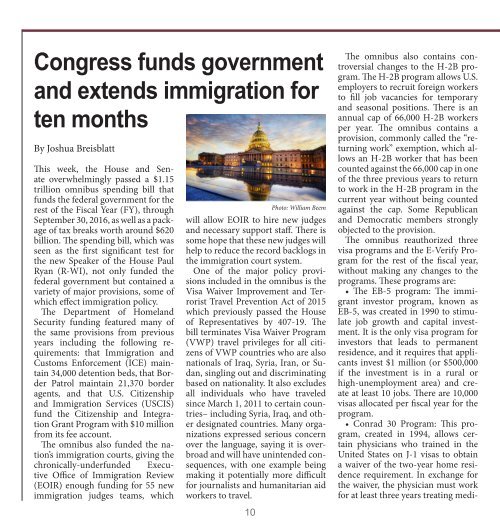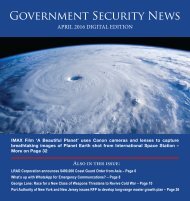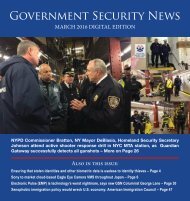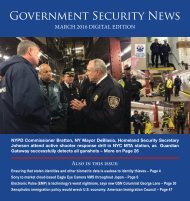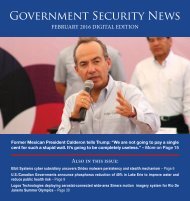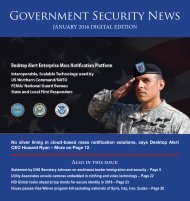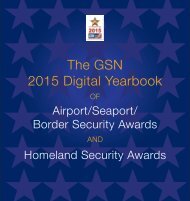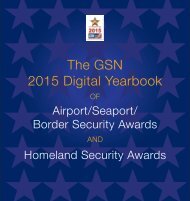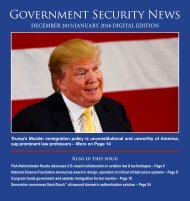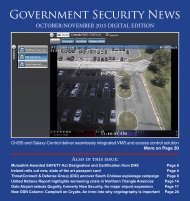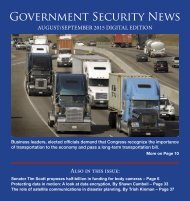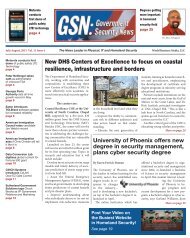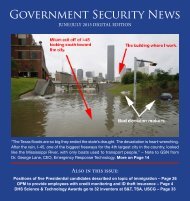GSN Dec 2015/Jan 2016 Digital Edition
You also want an ePaper? Increase the reach of your titles
YUMPU automatically turns print PDFs into web optimized ePapers that Google loves.
Congress funds government<br />
and extends immigration for<br />
ten months<br />
By Joshua Breisblatt<br />
This week, the House and Senate<br />
overwhelmingly passed a $1.15<br />
trillion omnibus spending bill that<br />
funds the federal government for the<br />
rest of the Fiscal Year (FY), through<br />
September 30, <strong>2016</strong>, as well as a package<br />
of tax breaks worth around $620<br />
billion. The spending bill, which was<br />
seen as the first significant test for<br />
the new Speaker of the House Paul<br />
Ryan (R-WI), not only funded the<br />
federal government but contained a<br />
variety of major provisions, some of<br />
which effect immigration policy.<br />
The Department of Homeland<br />
Security funding featured many of<br />
the same provisions from previous<br />
years including the following requirements:<br />
that Immigration and<br />
Customs Enforcement (ICE) maintain<br />
34,000 detention beds, that Border<br />
Patrol maintain 21,370 border<br />
agents, and that U.S. Citizenship<br />
and Immigration Services (USCIS)<br />
fund the Citizenship and Integration<br />
Grant Program with $10 million<br />
from its fee account.<br />
The omnibus also funded the nation’s<br />
immigration courts, giving the<br />
chronically-underfunded Executive<br />
Office of Immigration Review<br />
(EOIR) enough funding for 55 new<br />
immigration judges teams, which<br />
will allow EOIR to hire new judges<br />
and necessary support staff. There is<br />
some hope that these new judges will<br />
help to reduce the record backlogs in<br />
the immigration court system.<br />
One of the major policy provisions<br />
included in the omnibus is the<br />
Visa Waiver Improvement and Terrorist<br />
Travel Prevention Act of <strong>2015</strong><br />
which previously passed the House<br />
of Representatives by 407-19. The<br />
bill terminates Visa Waiver Program<br />
(VWP) travel privileges for all citizens<br />
of VWP countries who are also<br />
nationals of Iraq, Syria, Iran, or Sudan,<br />
singling out and discriminating<br />
based on nationality. It also excludes<br />
all individuals who have traveled<br />
since March 1, 2011 to certain countries–<br />
including Syria, Iraq, and other<br />
designated countries. Many organizations<br />
expressed serious concern<br />
over the language, saying it is overbroad<br />
and will have unintended consequences,<br />
with one example being<br />
making it potentially more difficult<br />
for journalists and humanitarian aid<br />
workers to travel.<br />
10<br />
Photo: William Beem<br />
The omnibus also contains controversial<br />
changes to the H-2B program.<br />
The H-2B program allows U.S.<br />
employers to recruit foreign workers<br />
to fill job vacancies for temporary<br />
and seasonal positions. There is an<br />
annual cap of 66,000 H-2B workers<br />
per year. The omnibus contains a<br />
provision, commonly called the “returning<br />
work” exemption, which allows<br />
an H-2B worker that has been<br />
counted against the 66,000 cap in one<br />
of the three previous years to return<br />
to work in the H-2B program in the<br />
current year without being counted<br />
against the cap. Some Republican<br />
and Democratic members strongly<br />
objected to the provision.<br />
The omnibus reauthorized three<br />
visa programs and the E-Verify Program<br />
for the rest of the fiscal year,<br />
without making any changes to the<br />
programs. These programs are:<br />
• The EB-5 program: The immigrant<br />
investor program, known as<br />
EB-5, was created in 1990 to stimulate<br />
job growth and capital investment.<br />
It is the only visa program for<br />
investors that leads to permanent<br />
residence, and it requires that applicants<br />
invest $1 million (or $500,000<br />
if the investment is in a rural or<br />
high-unemployment area) and create<br />
at least 10 jobs. There are 10,000<br />
visas allocated per fiscal year for the<br />
program.<br />
• Conrad 30 Program: This program,<br />
created in 1994, allows certain<br />
physicians who trained in the<br />
United States on J-1 visas to obtain<br />
a waiver of the two-year home residence<br />
requirement. In exchange for<br />
the waiver, the physician must work<br />
for at least three years treating medi-


